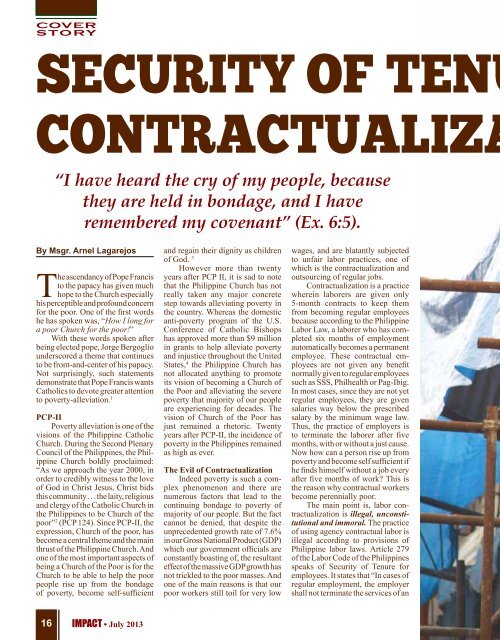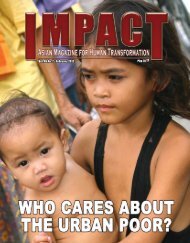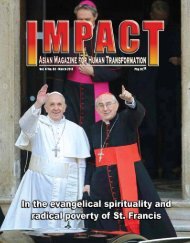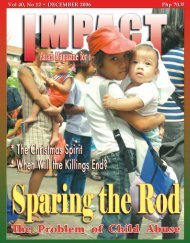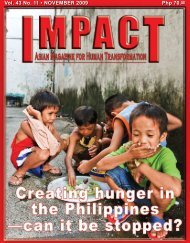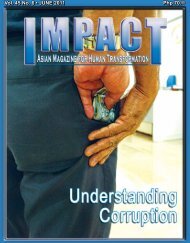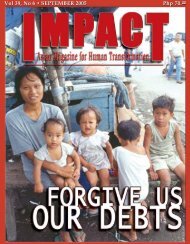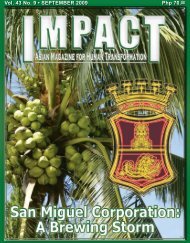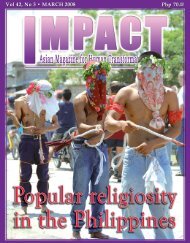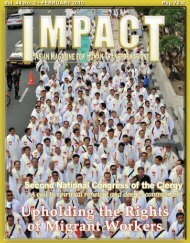Php 70.00 Vol. 47 No. 07 • July 2013 - IMPACT Magazine Online!
Php 70.00 Vol. 47 No. 07 • July 2013 - IMPACT Magazine Online!
Php 70.00 Vol. 47 No. 07 • July 2013 - IMPACT Magazine Online!
You also want an ePaper? Increase the reach of your titles
YUMPU automatically turns print PDFs into web optimized ePapers that Google loves.
Security of Tenu<br />
Contractualiza<br />
COVER<br />
STORY<br />
“I have heard the cry of my people, because<br />
they are held in bondage, and I have<br />
remembered my covenant” (Ex. 6:5).<br />
By Msgr. Arnel Lagarejos<br />
The ascendancy of Pope Francis<br />
to the papacy has given much<br />
hope to the Church especially<br />
his perceptible and profound concern<br />
for the poor. One of the first words<br />
he has spoken was, “How I long for<br />
a poor Church for the poor!”<br />
With these words spoken after<br />
being elected pope, Jorge Bergoglio<br />
underscored a theme that continues<br />
to be front-and-center of his papacy.<br />
<strong>No</strong>t surprisingly, such statements<br />
demonstrate that Pope Francis wants<br />
Catholics to devote greater attention<br />
to poverty-alleviation. 1<br />
PCP-II<br />
Poverty alleviation is one of the<br />
visions of the Philippine Catholic<br />
Church. During the Second Plenary<br />
Council of the Philippines, the Philippine<br />
Church boldly proclaimed:<br />
“As we approach the year 2000, in<br />
order to credibly witness to the love<br />
of God in Christ Jesus, Christ bids<br />
this community . . . the laity, religious<br />
and clergy of the Catholic Church in<br />
the Philippines to be Church of the<br />
poor” 2 (PCP 124). Since PCP-II, the<br />
expression, Church of the poor, has<br />
become a central theme and the main<br />
thrust of the Philippine Church. And<br />
one of the most important aspects of<br />
being a Church of the Poor is for the<br />
Church to be able to help the poor<br />
people rise up from the bondage<br />
of poverty, become self-sufficient<br />
and regain their dignity as children<br />
of God. 3<br />
However more than twenty<br />
years after PCP II, it is sad to note<br />
that the Philippine Church has not<br />
really taken any major concrete<br />
step towards alleviating poverty in<br />
the country. Whereas the domestic<br />
anti-poverty program of the U.S.<br />
Conference of Catholic Bishops<br />
has approved more than $9 million<br />
in grants to help alleviate poverty<br />
and injustice throughout the United<br />
States, 4 the Philippine Church has<br />
not allocated anything to promote<br />
its vision of becoming a Church of<br />
the Poor and alleviating the severe<br />
poverty that majority of our people<br />
are experiencing for decades. The<br />
vision of Church of the Poor has<br />
just remained a rhetoric. Twenty<br />
years after PCP-II, the incidence of<br />
poverty in the Philippines remained<br />
as high as ever.<br />
The Evil of Contractualization<br />
Indeed poverty is such a complex<br />
phenomenon and there are<br />
numerous factors that lead to the<br />
continuing bondage to poverty of<br />
majority of our people. But the fact<br />
cannot be denied, that despite the<br />
unprecedented growth rate of 7.6%<br />
in our Gross National Product (GDP)<br />
which our government officials are<br />
constantly boasting of, the resultant<br />
effect of the massive GDP growth has<br />
not trickled to the poor masses. And<br />
one of the main reasons is that our<br />
poor workers still toil for very low<br />
wages, and are blatantly subjected<br />
to unfair labor practices, one of<br />
which is the contractualization and<br />
outsourcing of regular jobs.<br />
Contractualization is a practice<br />
wherein laborers are given only<br />
5-month contracts to keep them<br />
from becoming regular employees<br />
because according to the Philippine<br />
Labor Law, a laborer who has completed<br />
six months of employment<br />
automatically becomes a permanent<br />
employee. These contractual employees<br />
are not given any benefit<br />
normally given to regular employees<br />
such as SSS, Philhealth or Pag-Ibig.<br />
In most cases, since they are not yet<br />
regular employees, they are given<br />
salaries way below the prescribed<br />
salary by the minimum wage law.<br />
Thus, the practice of employers is<br />
to terminate the laborer after five<br />
months, with or without a just cause.<br />
<strong>No</strong>w how can a person rise up from<br />
poverty and become self sufficient if<br />
he finds himself without a job every<br />
after five months of work? This is<br />
the reason why contractual workers<br />
become perennially poor.<br />
The main point is, labor contractualization<br />
is illegal, unconstitutional<br />
and immoral. The practice<br />
of using agency contractual labor is<br />
illegal according to provisions of<br />
Philippine labor laws. Article 279<br />
of the Labor Code of the Philippines<br />
speaks of Security of Tenure for<br />
employees. It states that “In cases of<br />
regular employment, the employer<br />
shall not terminate the services of an<br />
16 <strong>IMPACT</strong> <strong>•</strong> <strong>July</strong> <strong>2013</strong>


